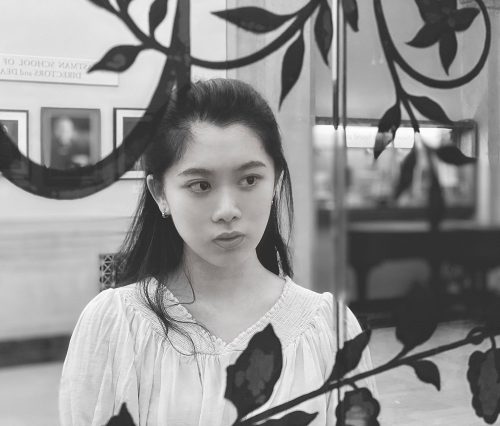Tonight and next Friday night you’ll have two chances to hear new music by a talented young Eastman student composition winner, Zihan Wu. Tonight, October 21 at 7:30 p.m., the Eastman School Symphony Orchestra premieres Zihan’s Three Songs after Japanese Haiku; next Friday, October 28 at 7:30 p.m., Musica Nova unveils her Seven Scenes After the World Falls into Darkness. (See the information and links at the end of the post for further details about these concerts.)
In an interview with Mason St. Pierre, Zihan Wu talked about herself and about her music.

Far Eastern culture and Western musical techniques combine in the music of Zihan Wu.
Tell us something about yourself!
I am originally from China and I am a senior double majoring in composition and piano. I have studied piano since I was four years old and have composed since I was eleven. I previously graduated from Music Middle School Affiliated to the Shanghai Conservatory of Music. My composition teacher includes every faculty member in the composition department and I study piano with Prof. Vincent Lenti and Prof. Douglas Humpherys. To me, piano and composition are equally important and they help each other to grow. My music varies from piece to piece, and I often incorporate symbolism, Oriental culture, and aesthetics with Western techniques in my music. I enjoy the sophisticated timbre, gesture, and mysterious sonority as well.
Can you describe the pieces you have composed for the Eastman School Symphony Orchestra and Musica Nova? What can the audience expect to hear in these compositions?
The piece that is going to be performed by ESSO is Three Songs based on Japanese Haiku for soprano and orchestra. Each of the Haiku uses one animal to describe some philosophical concept or poetic emotion. The relationship between the soprano and the orchestra is strongly connected to each other, together to depict my imagination toward these three short haiku. The piece combines some Japanese music aesthetics too, and there is even a short Wabi-Sabi interlude in the orchestra part.
The piece that is going to be performed by the Musica Nova is called Seven Scenes after the World Falls into Darkness, after Byron. It is a 30-minute piece for eleven performers and consists of seven movements that are inspired by the poem Darkness by Byron. I really liked this poem since high school and I finally determined to compose a piece relate to this poem back to the spring of 2020 at the beginning phase of Covid. The piece is programmatic and each movement depicts a scene that I extracted from the poem and is connected to each other.
It took me a long time to finish this ambitious project and it is like a miniature of all the disasters that happened in these two years in the world including forest fires, viruses, and so on. The poem is so magnificent since all the terrible scenes depicted by Byron gradually became the reality. Thus, this piece is like my lament to the things that happened to the world.
What is something you enjoy about the collaborative process between composer, conductor and ensemble?
I really appreciate the opportunity to work with these two wonderful ensembles, conductors, and my soprano Kat (master’s student Katriana Kirby-Kopczynski). I always feel that finishing a piece is just the start of the project and the process of rehearsing and the final premiere is what I learned the most. I played in the Musica Nova Ensemble since freshman year so I feel a strong bond with it. I think I learned a lot by playing in that ensemble due to the complexity of the repertoire. It is so magical that my work will be performed by the ensemble that has successfully performed the works by Xenakis, Boulez, Saariaho, and other composers that I admire a lot.
Kat and I were matched together a year ago, and we chose these three haiku together and worked together in the first phase of this project. Thus, the vocal writing is for her range and character. The orchestra part is not a typical orchestra work but involves some extended techniques and complex rhythm. I especially thank all the effort and work that all the performers and conductors put into these pieces.
Eastman School Symphony Orchestra
Neil Varon, conductor
Serena Reuten, conductor
Nicholas Sharma, conductor
Katriana Kirby-Kopczynski, soprano
SAUL Fanfare for Eastman *Centennial Premiere
SIBELIUS Finlandia, op. 26
WU Three Songs Based on Japanese Haiku *Student Composition Winner with Katriana Kirby-Kopczynski, soprano
DVOŘÁK Symphony No. 9 in E minor, op. 95, B. 178, “New World”
Brad Lubman, conductor
Georgia Mills and Luke Poeppel, assistant conductors
ZIHAN WU Seven Scenes after the World Falls into Darkness
ROBERT HONSTEIN Endless Landscape
EDGARD VARÈSE Intégrales

